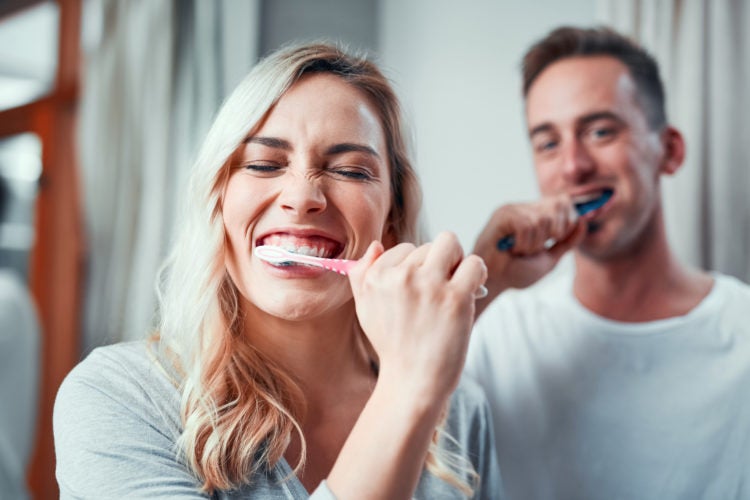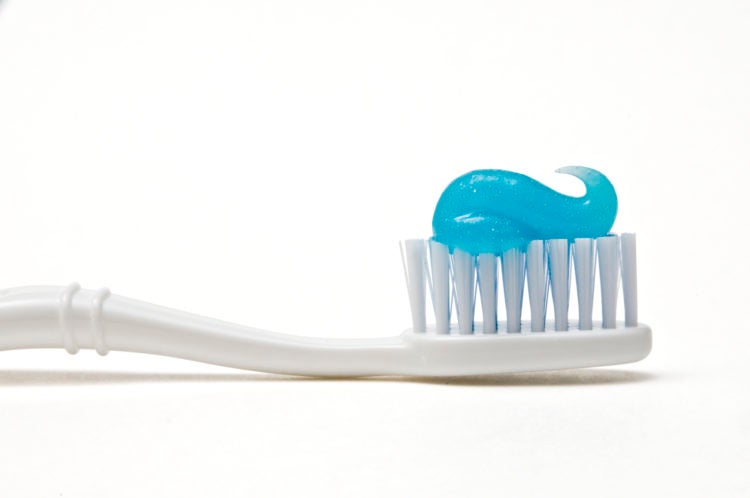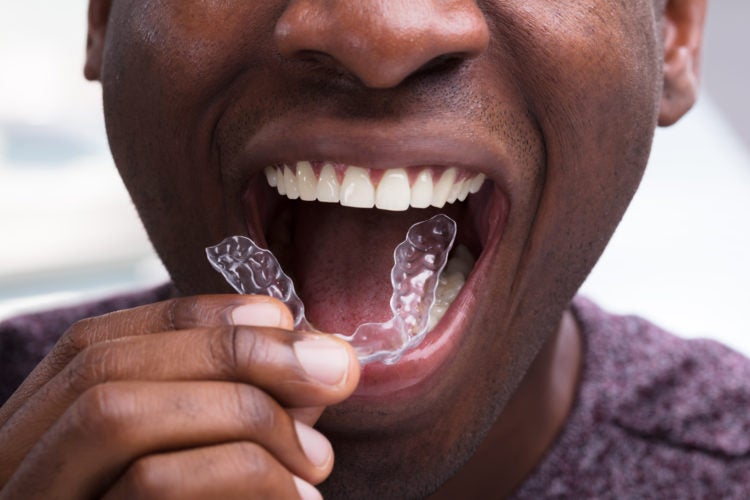-
4 Tips for Better Dental Health

You’ve heard it all before: brush your teeth twice daily, floss regularly, see your dentist every six months, and don’t eat too much sugar. Still, even if you do everything right, you may learn that you need the occasional filling. Why would that be? The fact is, you might be doing it wrong.
First, let’s talk about brushing.
By brushing, you remove plaque, a sticky substance made of bacteria, bacterial acid, sticky byproducts and remnants of food. Plaque forms on teeth immediately after you eat, and for a while, it just sits there. After about 12 hours, it matures and starts damaging your teeth. The bacteria consume sugar and produce acids, which dissolve the minerals out of your teeth, forming microscopic holes. If you don’t stop the process, those holes turn into cavities.
How do you stop it? First, spend two minutes brushing your teeth, twice a day. Two minutes might seem like a long time, but it’s good for effectively removing plaque. Brushing for two minutes twice a day keeps bacteria from reaching the stage where it starts producing acid. A small, medium-bristled toothbrush, employed in small, circular, back and forth motions will clean your teeth effectively without harming your gums.
You should be using fluoride, but you should also be using disclosure tablets.
Fluoride toothpaste prevents tooth decay by replacing lost minerals and making your teeth stronger. Ask your dentist for recommendations, because some brands don’t have strong enough fluoride. Another tool for conquering plaque is disclosure tablets, which make plaque visible so you can see the spots you’ve missed.
Spitting is better than rinsing.
You don’t produce very much saliva at night, making your teeth more vulnerable when you’re sleeping than they are during the day. Brush before bed to remove plaque and food debris, but don’t rinse your mouth, because you’ll rinse away the fluoride before it gets a chance to work. Just spit, and then don’t eat or drink anything except water.
Watch your sugar even more than you are.
You may think you’re limiting sugar enough, but it can be helpful to count the amounts of “sugar hits” you’re consuming each day, keeping it to four or less. One can of soda has more sugar than you should consume in one day. While sugars found in whole fruits are not damaging, sugar in processed carbohydrates like chips and sweet snacks counts as a sugar hit.
One of the best things you can do for your dental health is to see a dentist every six months.
If you’re looking for a dentist in New York, consider Park 56 Dental Group, where we provide personalized, quality dental care in a spa-like environment. We serve the Midtown, Central Park, Upper East Side, Park Avenue, and all surrounding Manhattan and New York areas, with a patient-centered practice that has hours to fit your schedule. Schedule your complimentary consultation today by contacting us online or calling (212) 826-2322.
-
When It’s Not a Good Idea to Brush Your Teeth After You Eat

So you know you’re supposed to brush your teeth at least twice a day, right? If you’re like most of us, you probably figure that the more times a day you brush your teeth, the better. Well, guess what? According to dentists, afterward after a meal can do more harm than good.
Do you brush your teeth after breakfast? It may be better to brush when you first wake up, instead. This is because when you eat or drink something with a low pH level, it can damage your enamel to brush immediately afterward. Which foods have low pH levels? Anything acidic, like citrus fruits. So if you’ve had orange juice with your breakfast, for instance, brushing your teeth right after your meal can wear away at your enamel. (By the way, coffee is acidic too, but not as acidic as citrus.)
Why is it bad to brush after eating acidic foods? These foods can soften your enamel, and then when you brush, you can wear that enamel down. When your enamel wears away, it allows cavities to form in your mouth. If you’ve eaten anything sugary that can stick to your teeth, you’re at an even higher risk of cavities, because that sugar can stay in the mouth even after brushing. Rather than brushing right after a meal, it’s a better idea to rinse with water to remove any food particles from your mouth, and then wait at least thirty minutes after a meal before picking up your toothbrush.
What happens during those thirty minutes? Your saliva goes to work. Saliva is one of the body’s biggest defenses against tooth enamel erosion and cavities. It neutralizes the pH in your mouth, making it safe for you to brush without fear of eroding your teeth.
For optimal oral health, brush at least twice a day, allowing at least thirty minutes after a meal before brushing. Use a soft-bristled brush, and brush your teeth for two minutes, using short, circular back and forth motions, and remembering to brush your tongue as well. Floss at least once a day, and use a mouthwash with fluoride. Eat a nutrient-dense diet, full of fruits, vegetables, and calcium-rich foods, and see your dentist every six months.
If you’re looking for a dentist in New York, consider Park 56 Dental Group, where we provide personalized, quality dental care in a spa-like environment. We serve the Midtown, Central Park, Upper East Side, Park Avenue, and all surrounding Manhattan and New York areas, with a patient-centered practice that has hours to fit your schedule. Schedule your complimentary consultation today by contacting us online or calling us at (212) 826-2322.
-
Oral Health Tips

Is it inevitable for people to lose their teeth as they get older? Many people believe that to be true, but in fact, it’s a persistent myth. It’s normal to lose your baby teeth, but losing your adult teeth is not a normal part of the aging process. In fact, if you take care of your teeth, you can maintain good oral health throughout your lifetime. We’ve got some tips to help you make that happen.
- First, embrace fluoride. Some people are skeptical about fluoride because they believe it to be dangerous. Misinterpreting data, people claim that fluoride causes everything from dementia to bone cancer. In fact, every major health organization is in agreement that fluoride is beneficial. By adding fluoride to the community water systems, the United States has reduced oral health problems significantly. Drinking fluoridated water and brushing with fluoride toothpaste protects teeth from decay.
- Make good oral hygiene a habit. Brush your teeth for two minutes, two times a day. Floss between your teeth at least once a day, and follow it up by rinsing with a fluoride mouthwash. Visit your dentist every six months, so that any problems with your mouth can be caught early.
- Just say no to tobacco. Don’t use any tobacco products at all. If you are a smoker, quit. If you’re having trouble quitting, talk to your doctor and get some help.
- Limit your alcohol consumption. Drinking too much alcohol greatly increases your risk of oral cancer.
- Keep diabetes under control. Diabetes can increase your risk of gum disease and other complications. At the same time, periodontal disease can increase blood sugar.
- Pack your diet with nutrients. Limit sugar, eat nutrient-dense foods like fruits and vegetables, along with plenty of protein and calcium. Drink water to stay hydrated.
- Try to avoid dry mouth. If you’re taking medication that causes dry mouth, ask for a different medication. If it is unavoidable, drink plenty of water and chew sugarless gum. Saliva helps keep your mouth’s pH healthy.
- See your dentist as soon as possible if there’s a problem. Sudden, changes in taste or smell should be reported immediately.
If you’re a caregiver for an older person, assist in brushing and flossing if the person can’t do it independently. Schedule regular dental exams for the person in your care, and be aware of the way any medication may be affecting his or her oral health. Often, medication can impede a senior’s ability to practice good oral hygiene and can cause dental issues like dry mouth.
If you need a dentist in New York, consider Park 56 Dental Group, where we provide personalized, quality dental care in a spa-like environment. We serve the Midtown, Central Park, Upper East Side, Park Avenue, and all surrounding Manhattan and New York areas, with a patient-centered practice that has hours to fit your schedule. Schedule your complimentary consultation today by contacting us online or calling us at (212) 826-2322.
-
Invisalign FAQs

Invisalign is a popular treatment for gradually straightening teeth, using clear, removable aligners. It doesn’t involve brackets or wires and isn’t as restrictive as metal braces. If you’re interested in Invisalign, you probably have some questions about how it works, so we’ve put together this list of frequently asked questions to help you decide whether Invisalign is right for you.
- What is Invisalign, and how does it work? Invisalign uses aligners made of a patented thermoplastic material called SmartTrack®, which is FDA-approved and contains no BPA, BPS, latex, or gluten. These aligners are virtually invisible, because they’re thin, clear, and fit over your teeth snugly. Using a unique, digital treatment plan created by your doctor, the Invisalign aligners are designed to apply force at exactly the right place and time, and your progress will be closely monitored by your doctor.
- Why should I choose Invisalign? The aligners’ near-invisibility is a major benefit, primarily because people might not even notice you’re wearing them. Unlike traditional braces, the aligners can be removed when you eat, drink, brush, and floss, and for special occasions. There are different aligners on the market, but Invisalign aligners are the only ones made of SmartTrack, which fits better and is more comfortable.
- Can anyone use Invisalign? Invisalign is a great way for both adults and teens to improve their smile without the hassle of traditional braces. Almost all common teeth-straightening and bite issues can be fixed using Invisalign’s innovations and technological advancements. There’s even a blue dot on the outside of teen aligners, to help parents make sure their teens are wearing their aligners enough.
- How many hours a day must I wear Invisalign? You’ll need to wear your aligners 20 to 22 hours each day, changing to a new set of aligners every week or two, under the guidance of your doctor. You’ll have regular appointments with your doctor, typically every four to six weeks, to monitor your progress.
- How long does Invisalign treatment take? The length of Invisalign treatment varies from patient to patient and depends on a variety of factors. Your doctor will evaluate the complexity of your case to determine how long your treatment should take, but how conscientious you are about wearing your aligners will have an impact on your progress as well. The average treatment time is 12-18 months, but many patients begin seeing results in just a matter of weeks.
- Can every dentist and orthodontist provide Invisalign treatment? Doctors who want to offer Invisalign treatment to their patients must complete specialized training and become certified Invisalign providers.
Park 56 Dental Group is a certified Invisalign provider, offering personalized, quality dental care in a spa-like environment. We serve the Midtown, Central Park, Upper East Side, Park Avenue, and all surrounding Manhattan and New York areas, with a patient-centered practice that has hours to fit your schedule. Schedule your complimentary consultation today by contacting us online or calling us at (212) 826-2322.
RECENT POSTS
categories
- Uncategorized
- Cosmetic Dentistry
- Veneers
- Healthier Teeth
- Teeth Whitening
- Dental Health
- Video
- Dental Emergencies
- Invisalign
- Dental Implants
- Root Canal
- Sedation Dentistry
- Infographic
- Dental Crowns and Bridges
- Dental Anxiety
- Gum Disease
- COVID-19
- Bad Breath
- New York Dentist
- Cut out sugar
- General Dentistry
- Oral Health
- Oral Cancer
- Dry Mouth
- Gum Health
- Toothache
- Dental Sealants
- Cavities
